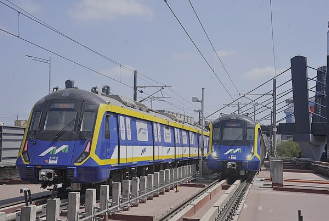The proposed extension of Bengaluru’s metro network to Hosur in Tamil Nadu remains in limbo, as key stakeholders continue to deliberate over the project’s feasibility and funding arrangements. While initial discussions have taken place, no definitive decisions have been made, leaving the future of this ambitious interstate metro link uncertain.
On 27 August, officials from the Chennai Metro Rail Limited (CMRL) met with their counterparts at the Bengaluru Metro Rail Corporation Limited (BMRCL) to discuss the technical and financial aspects of extending the Namma Metro line to Hosur Despite these discussions, BMRCL clarified that the detailed feasibility report (DFR) for the project is still incomplete, with a senior official stating, “The finalisation of any funding strategy will depend entirely on the completion of the DFR.” This report is crucial for assessing the viability of the metro extension and determining how costs might be shared between the two states.
The proposed metro line aims to connect Bengaluru’s Bommasandra area to Hosur, spanning 23 kilometres, with a split of 11 kilometres in Tamil Nadu and 12 kilometres in Karnataka. This extension is expected to feature 12 stations and a metro depot, enhancing connectivity between the regions and potentially boosting economic activity by facilitating smoother commutes for the workforce in the industrial hub of Hosur. The area is home to a large number of small and medium enterprises, as well as major companies like Ashok Leyland, TVS, and Titan. Additionally, it has become a growing centre for electric vehicle manufacturing, with firms such as Ather, Ola Electric, and Simple Energy setting up production units in the Hosur-Krishnagiri-Dharmapuri region. However, the financial dynamics of the project present a significant challenge. Reports suggest that Karnataka may not contribute financially to the project, given that the proposal originated from Tamil Nadu. This has raised concerns about how the substantial costs associated with the metro extension will be managed. The completion of the DFR is expected to provide clarity on these financial matters and outline the next steps for both state governments.
Adding to the complexity, the proposed metro extension comes amidst Tamil Nadu’s plans to develop an international airport in Hosur, which has sparked concerns in Karnataka. The new airport, coupled with direct metro connectivity from Bengaluru’s IT corridor, could potentially draw investment away from Bengaluru’s own infrastructure projects, including a proposed second airport. The existing Kempegowda International Airport is situated on the northern periphery of Bengaluru, far from the city’s southeast IT hub. In contrast, Hosur is much closer to this crucial area, making the metro extension an attractive proposition for easing commuter traffic. The extension of the metro line to Hosur would mark the first interstate metro connectivity in South India, a significant milestone for regional integration. Yet, the project’s fate remains uncertain, contingent upon the finalisation of the DFR and subsequent negotiations on cost-sharing and funding. Until these aspects are conclusively addressed, the vision of a seamless metro link connecting Bengaluru and Hosur will remain a work in progress.


